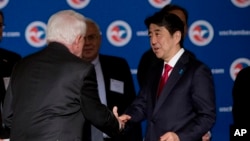The Obama administration rolled out the red carpet for Japanese Prime Minister Shinzo Abe's visit to Washington. A strengthening and forward-looking alliance has been the main theme of the trip.
Japan Foreign Ministry spokesman Yasuhisa Kawamura said his country welcomes the U.S. "pivot" to Asia and wants expanded opportunities to work with Washington on a large range of issues.
"The two allies [are] no longer just [doing] the regional collaborations, but should go beyond to address global challenges," he said. "So, in this context it is an ongoing effort, hand in hand with the United States and Japan. We will continue to face those challenges."
Kawamura said Tokyo would continue working with the U.S. and South Korea to deal with threats posed by North Korea's nuclear and missile programs.
He acknowledged recently strained ties with Seoul over historical issues, such as the Japanese army's use of so-called "comfort women" during World War II. But he said that "if you look at the past couple months, we have seen encouraging developments in our relations with South Korea." He noted that the foreign ministers of Japan, South Korea and China had met in Seoul recently for the first time in three years and had discussed the North Korean security situation.
On trade issues, the spokesman said, the U.S. and Japan have made "substantial" progress in talks on the Trans Pacific Partnership trade deal, known as TPP. He said it was up to Washington and Tokyo to "take the leading role" in finalizing the deal, which would include 12 nations of the Asia-Pacific region.
Concerning China's new Asian Infrastructure Investment Bank, or AIIB, Kawamura said Japan does see a strong demand for such help from developing nations. But he added that Tokyo, which declined to join the bank, as did the U.S., still has concerns about governance and transparency in the institution.




